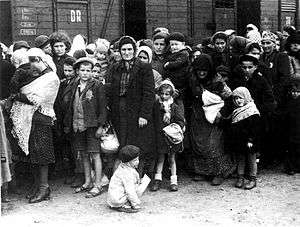Charles Zentai
| Part of a series on | ||||||||||
| The Holocaust | ||||||||||
|---|---|---|---|---|---|---|---|---|---|---|
 | ||||||||||
|
||||||||||
|
Atrocities |
||||||||||
|
Camps
|
||||||||||
|
Lists Deportations of French Jews
to death camps |
||||||||||
|
Remembrance |
||||||||||
Charles Zentai, born Károly Steiner (born October 8, 1921), is a Hungarian-born resident of Australia accused of a Holocaust-related war crime. He has resided in Perth, Australia for many years after living in the American- and French-occupied zones of post-World War II Germany. He was on the Simon Wiesenthal Center's list of most wanted Nazi war criminals until 2013.
Background
Zentai, who denies the charges against him, was serving in the Hungarian Army as warrant officer at the time he is accused of having murdered Péter Balázs, an 18-year-old Jewish man, in November 1944.[1] According to witnesses, Balázs was not wearing his yellow star on the train, a crime punishable by death in German occupied Hungary at the time. Zentai allegedly took him to an army barracks, beat him to death, and threw his body into the Danube.[2] Zentai was tracked down by The Simon Wiesenthal Center, which is also heading the effort to extradite him to Hungary to stand before a military tribunal.[1] The case has been a long-held passion of Efraim Zuroff, director of the Simon Wiesenthal Center, who presented his allegations against Zentai to Hungarian prosecutors.[3]
On 8 July 2005 Zentai was arrested by the Australian Federal Police to await an extradition hearing. Zentai's family say the 86-year-old widower, who has heart disease and peripheral neuropathy, would not survive the trip to Hungary.[4] When first declared a suspect during the war and a warrant issued for his arrest Zentai, at that time living in Germany, expressed his willingness to go to Hungary to clear his name.
Extradition fight
On 16 April 2007 his first appeal against the extradition case was dismissed by a full bench of the Federal Court of Australia.[5] Simon Wiesenthal Center director Efraim Zuroff said he was very pleased that Zentai's appeals had been rejected and that "the extradition process can finally proceed."[6]
On 1 October 2007 new evidence came to light: a testimony by Zentai's military commander which was used at a trial in the Budapest People's Court in February 1948. This commander blamed a fellow soldier who was later convicted.[7] On 2 March 2009, and despite these accusations, Zentai passed a polygraph test conducted by Gavin Willson from Australian Polygraph Services. In interviews, Willson expressed "no doubt" that Zentai was telling him the truth.[1]
Zentai's lawyers continued to argue against extradition, saying that war crimes were not considered illegal in Hungary in 1944 when the alleged crime took place.[8] Zentai remained free on bail while his case was again appealed to the full bench of the Australian Federal Court.[9] The Australian government approved Zentai's extradition to Hungary on November 12, 2009, making Zentai's case the first in which the Australians approved of extraditing any Nazi suspect.[10]
After an appeal to the Federal Court the extradition order was overturned on 2 July 2010. During the appeal Zentai's defence lawyers argued that Zentai could not be extradited, as the Hungarian authorities had not charged him with an offence, and instead he was only being ordered to return to face questioning. The court found that the government did not have the jurisdiction to order Zentai to be extradited.[11]
In early January 2011 the Australian Home Affairs Minister Brendan O'Connor lodged an appeal against the decision (that as the Hungarian authorities had not laid charges, the Australian government did not have the legal power to extradite him). The Hungarian authorities have not explained why they could not question him in Australia under the treaty on criminal cooperation. In their public response to the decision, the Simon Wiesenthal Centre assumed Zentai will face trial if extradited.
On 15 August 2012, the High Court of Australia ruled that 90-year-old Zentai cannot be extradited to Hungary on a technicality because the offence of a "war crime" did not exist in Hungarian law in 1944, which is a requirement under Australia's extradition treaty with Hungary.[12]
See also
Notes
- 1 2 3 Malkin, Bonnie (11 March 2009). "Suspected Nazi fights extradition from Australia to Hungary". The Daily Telegraph. Telegraph Media Group. Retrieved 7 April 2009.
- ↑ Buckley-Carr, Alana (21 August 2008). "'War criminal' Charles Zentai loses extradition fight over 1944 murder". The Australian. News Limited. Retrieved 3 July 2009.
- ↑ Zuroff, Efraim (September 2007). "ZENTAI CASE". Shalom Magazine. Retrieved 3 July 2009.
- ↑ "Trial will kill me, says Nazi suspect". The Australian. News Limited. 1 May 2008. Retrieved 3 July 2009.
- ↑ "Zentai loses appeal against extradition hearing". ABC Online. 2007-04-16. Retrieved 2007-04-16.
- ↑ Taylor, Paige (23 April 2008). "Zentai loses High Court Appeal". The Australian. News Limited. Retrieved 3 July 2009.
- ↑ Taylor, Paige (1 October 2007). "Testimony 'clears' Zentai's name". The Australian. News Limited. Retrieved 21 August 2008.
- ↑ Guest, Debbie (31 March 2009). "Accused war criminal Zentai loses Hungary extradition appeal". The Australian. News Limited. Retrieved 3 July 2009.
- ↑ Guest, Debbie (13 May 2009). "Accused war criminal Charles Zentai avoids jail after Hungary supports bail". The Australian. News Limited. Retrieved 3 July 2009.
- ↑ Smith, Tanalee. "Australia OKs Extradition of Accused Nazi Criminal". Associated Press. 12 November 2009. Retrieved 12 November 2009.
- ↑ "Accused war criminal Charles Zentai wins fight against extradition to Hungary". The Australian. 2 July 2010. Retrieved 2 July 2010.
- ↑ CFormer soldier Zentai wins extradition fight, Australian Broadcasting Corporation, August 15, 2012
Further reading
- Vámos, György (March 2009). "Murder on Arena Avenue: Is Charles Zentai Guilty?". The Monthly. 43: 36–41.
- Zentai v Honourable Brendan O'Connor (No 3) 2010 FCA 691 (2 July 2010)
- High Court of Australia ruling (15 August 2012)